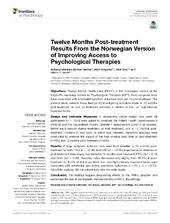| dc.contributor.author | Sæther, Solbjørg Makalani Myrtveit | |
| dc.contributor.author | Knapstad, Marit | |
| dc.contributor.author | Grey, Nick | |
| dc.contributor.author | Smith, Otto Robert Frans | |
| dc.date.accessioned | 2020-04-15T07:43:36Z | |
| dc.date.available | 2020-04-15T07:43:36Z | |
| dc.date.issued | 2019-10-19 | |
| dc.Published | Sæther SMMS, Knapstad M, Grey N, Smith ORF. Twelve Months Post-treatment Results From the Norwegian Version of Improving Access to Psychological Therapies. Frontiers in Psychology. 2019;10:2303 | eng |
| dc.identifier.issn | 1664-1078 | |
| dc.identifier.uri | https://hdl.handle.net/1956/21856 | |
| dc.description.abstract | Objectives: Prompt Mental Health Care (PMHC) is the Norwegian version of the England’s Improving Access to Psychological Therapies (IAPT). Both programs have been associated with substantial symptom reductions from pre- to post-treatment. The present study extends these findings by investigating symptom levels at 12 months post-treatment, as well as treatment outcome in relation to low- vs. high-intensity treatment forms. Design and Outcome Measures: A prospective cohort design was used. All participants (n = 1530) were asked to complete the Patient Health Questionnaire-9 (PHQ-9) and the Generalized Anxiety Disorder-7 questionnaire (GAD-7) at baseline, before each session during treatment, at final treatment, and at 12 months post-treatment. Cohen’s d was used as effect size measure. Sensitivity analyses were conducted to examine the impact of the high missing data rates at post-treatment (≈44%) and 12 months post-treatment (≈58%). Results: A large symptom reduction was seen from baseline to 12 months post-treatment for both PHQ (d = −0.98) and GAD (d = −0.94). Improvements observed at post-treatment were largely maintained at 12 months post-treatment (PHQ (Δd = 0.10) and GAD (Δd = 0.09). Recovery rates decreased only slightly from 49.5% at post-treatment to 45.0% at follow-up. Both low- and high-intensity treatment forms were associated with substantial and lasting symptoms reductions (−1.26 ≤ d ≤ −0.73). Sensitivity analyses did not substantially alter the main results. Conclusion: The findings suggest long-lasting effects of the PMHC program and encourage the use of low-intensity treatment forms in PMHC like settings. | en_US |
| dc.language.iso | eng | eng |
| dc.publisher | Frontiers | eng |
| dc.rights | Attribution CC BY | eng |
| dc.rights.uri | http://creativecommons.org/licenses/by/4.0/ | eng |
| dc.subject | prompt mental health care | eng |
| dc.subject | CBT | eng |
| dc.subject | anxiety | eng |
| dc.subject | depression | eng |
| dc.subject | IAPT | eng |
| dc.subject | real-life settings | eng |
| dc.subject | long-term follow-up | eng |
| dc.title | Twelve Months Post-treatment Results From the Norwegian Version of Improving Access to Psychological Therapies | eng |
| dc.type | Peer reviewed | |
| dc.type | Journal article | |
| dc.date.updated | 2019-12-18T13:37:41Z | |
| dc.description.version | publishedVersion | |
| dc.rights.holder | Copyright 2019 The Author(s) | eng |
| dc.identifier.doi | https://doi.org/10.3389/fpsyg.2019.02303 | |
| dc.identifier.cristin | 1762603 | |
| dc.source.journal | Frontiers in Psychology | |

